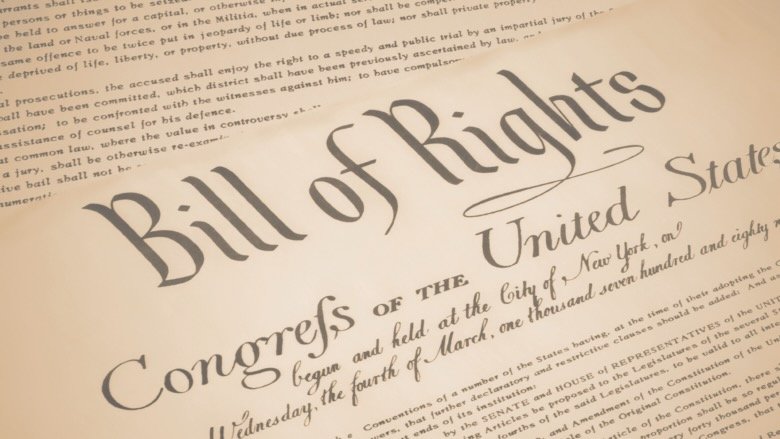
Check this page regularly for a collection of the most interesting and informative articles related to public records issues.

Doxing claim rejected by Oregon appeals court
In a case that tested Oregon's new anti-doxing law, the state Court of Appeals rejected a claim by Newberg school board members who sought compensation for social media postings they claimed were illegal sharing of private information.

ProPublica Partner Sues Mississippi County for Blocking Access to Search Warrants
The Northeast Mississippi Daily Journal has sued the state's Union County, asking a judge to order that search warrants in its county-level justice court be made open for public inspection.
The lawsuit comes after an investigation in 2022 by the Daily Journal and ProPublica found that almost two-thirds of Mississippi’s justice courts obstruct access to search warrants and to the affidavits used by police to obtain them.

Informed dissent: Toward a constitutional right to know
In this article, Martin E. Halstuk and Benjamin W. Cramer argue that the American judiciary should recognize a constitutional right of access to government information for purposes of self-government. This argument builds upon the “consent of the governed” ideals of John Locke.

Foundation overseeing Ohio opioid funds must make records public
Reuters reports that in a unanimous opinion, the Supreme Court of Ohio rejected OneOhio Recovery Foundation's argument that, as a private foundation, it was not subject to the state's public records law. The court found that the foundation was the "functional equivalent of a public office."

Board overseeing Pennsylvania's $1 billion in opioid settlements criticized for secret meetings
The Pennsylvania Opioid Misuse and Addiction Abatement Trust is responsible for ensuring that counties and other local governments appropriately spend hundreds of millions of dollars expected to come their way from settlements with opioid companies. That money is intended to help Pennsylvania respond to a crisis that kills thousands of people annually in the state. Before the trust held a public meeting in March, it had been meeting in secret for months

Members In the News: TransUnion Introduces TruLookup™ Veteran Connect Solution to Help State Agencies Better Serve Those Who Served
Recent TransUnion research finds veterans consistently moved across state lines at more than twice the rate of non-veterans over a five-year period.
U.S. veterans moved across state lines at more than double the rate of non-veterans over the past five years, adding to the hindrances facing Department of Veteran Affairs’ outreach efforts. For this reason, TransUnion (NYSE: TRU) today unveiled its TruLookup™ Veteran Connect solution to help state agencies more effectively provide services and support.

Lawsuit Challenges Law That Shields Home Addresses of Judges, Law Enforcement
A New Jersey law that shields the home addresses of judges and law enforcement officers from the public is unconstitutional when applied to journalists seeking to report on public officials, the American Civil Liberties of New Jersey argues in a new lawsuit targeting New Brunswick officials.

Editorial: L.A. city attorney’s attempt to weaken public records law is harmful and wrong
Hydee Feldstein Soto has launched a misguided effort to weaken the state’s bedrock government transparency law.
Fresh off an embarrassing attempt to claw back Los Angeles police officer photos the city released in response to a public records request, City Atty. Hydee Feldstein Soto has launched another misguided effort — this time to weaken the state’s bedrock government transparency law.

Wrap-up: Colorado legislature again shuns CORA cost reform in 2023 session but removes some obstacles for records requesters
CFOIC had hoped the CORA bill would curb the fees government entities can charge to process records requests, especially after an expected bill on this topic never materialized in 2022. We’ve sounded the alarm about expensive CORA charges for years and pointed out last summer that soaring inflation could boost the maximum hourly research-and-retrieval rate — currently $33.58 — to $40 or more when Legislative Council recalculates it on July 1, 2024, as the law requires.

Texas Public Records Transparency Bill That Got Lost Amid GOP Infighting Finally Headed to Governor’s Desk
State law allows government agencies to withhold or heavily redact law enforcement records if a person has not been convicted of a crime or received probation. If approved by Abbott, the bill would close a long-standing loophole in the law that government agencies have used to withhold information in situations in which suspects die in police custody, are killed by law enforcement or kill themselves, as ProPublica and The Texas Tribune reported last month.

Bill would require public agencies across Alabama to respond to public records requests
In 2022, Huntsville received the “Golden Padlock” award from the Investigative Reporters and Editors, highlighting secretive governments, for failing to release body camera footage after a police officer shot and killed a man suffering from suicidal ideation.

Public Records Law and State Legislatures
In most states, legislatures are subject to the public records laws that apply to other public entities. However, these laws may contain exemptions that apply to the legislative branch, either for certain offices, such as the auditor or legal services, or for certain types of correspondence and documentation related to working papers, bill drafts and other records.

After a Soldier Died by Suicide, His Family Was Denied the Police Records. Texas Law Makes That Possible.
Killeen officials denied the soldier’s mother the records by citing an exception in Texas’ public records law that allows law enforcement agencies to withhold or heavily redact police reports if a person has not been convicted or received deferred adjudication in the case. The rule was established in 1997 as a way to protect the privacy of people who were accused of or arrested for criminal activity that’s never substantiated.

Wrap-up: Colorado legislature again shuns CORA cost reform in 2023 session but removes some obstacles for records requesters
Senate Bill 23-286, which passed on the General Assembly’s final day Monday, prohibits state agencies and local governments from requiring requesters to show identification to get CORA records. It obligates records custodians to accept credit cards or electronic payments for records if they already take them for other products and services, and it bars per-page charges for records provided in digital formats such as PDFs.

Public Integrity acquires tool to make data more accessible to journalists
The Accountability Project (TAP) solves a problem for journalists: Searching across public data sets can be arduous, particularly on deadline. It also creates opportunity: Finding threads across campaign finance data, property records, business ownership and other sources can yield important stories about conflicts of interest, outsized influence and other issues that warrant deeper public scrutiny.

Missouri childcare deserts include nearly half of kids 5 and under, new data shows
Almost half of all children in Missouri ages 5 and under, or about 202,000 kids, now live in child care deserts, The Missouri Independent and MuckRock found as part of a joint investigation, “Disappearing Day Care,” drawing from public records and data provided by the advocacy group Child Care Aware.

FOIA 101: Tips and Tricks to Make You a Transparency Master
Whether it’s your first request or your first request today, it never hurts to go over the basics. MuckRock’s compiled a lot of FOIA advice over the years, and with this project, it’s all in one place.

The Foilies 2023: Recognizing the worst in government transparency
“Misbehavior like this is why we created The Foilies, our annual tongue-in-cheek “awards” for agencies and officials that thwart the public’s right to government information or otherwise respond outrageously to requests for documents and records. Each year, the Electronic Frontier Foundation and MuckRock News, in partnership with the Association of Alternative Newsmedia, publish this list of ne’er-do-wells to celebrate Sunshine Week (March 12-18)—an annual event to raise the profile of the democratic concept of government transparency.”

ProPublica reporter wins 2023 Brechner Freedom of Information Award
Most experts agree that 911 call analysis is junk science. But Murphy’s reporting documented more than 100 cases in 26 states where law enforcement used the results of 911 call analysis against defendants, often outside proper legal discovery obligations and without scrutiny.

N.H. governor’s policy to destroy records within 30 days raises transparency concerns
The problem, as Spencer and advocates of government transparency see it, is that by the time someone requests certain e-mails or documents, they may have already been deleted or discarded. They believe the Governor’s policy of deleting correspondence and records within 30 days is illegal — and plan to challenge it in court.
